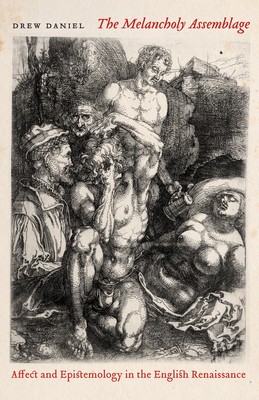
- We will send in 10–14 business days.
- Author: Drew Daniel
- Publisher: Fordham University Press
- ISBN-10: 0823251276
- ISBN-13: 9780823251278
- Format: 16 x 23.1 x 2.5 cm, hardcover
- Language: English
- SAVE -10% with code: EXTRA
Reviews
Description
This book considers melancholy as an "assemblage," as a network of dynamic, interpretive relationships between persons, bodies, texts, spaces, structures, and things. In doing so, it parts ways with past interpretations of melancholy. Tilting the English Renaissance against the present moment, Daniel argues that the basic disciplinary tension between medicine and philosophy persists within contemporary debates about emotional embodiment.
To make this case, the book binds together the paintings of Nicholas Hilliard and Isaac Oliver, the drama of Shakespeare, the prose of Burton, and the poetry of Milton. Crossing borders and periods, Daniel combines recent theories which have--until now--been regarded as incongruous by their respective advocates. Asking fundamental questions about how the experience of emotion produces community, the book will be of interest to scholars of early modern literature, psychoanalysis, the affective turn, and continental philosophy.EXTRA 10 % discount with code: EXTRA
The promotion ends in 15d.07:48:08
The discount code is valid when purchasing from 10 €. Discounts do not stack.
- Author: Drew Daniel
- Publisher: Fordham University Press
- ISBN-10: 0823251276
- ISBN-13: 9780823251278
- Format: 16 x 23.1 x 2.5 cm, hardcover
- Language: English English
This book considers melancholy as an "assemblage," as a network of dynamic, interpretive relationships between persons, bodies, texts, spaces, structures, and things. In doing so, it parts ways with past interpretations of melancholy. Tilting the English Renaissance against the present moment, Daniel argues that the basic disciplinary tension between medicine and philosophy persists within contemporary debates about emotional embodiment.
To make this case, the book binds together the paintings of Nicholas Hilliard and Isaac Oliver, the drama of Shakespeare, the prose of Burton, and the poetry of Milton. Crossing borders and periods, Daniel combines recent theories which have--until now--been regarded as incongruous by their respective advocates. Asking fundamental questions about how the experience of emotion produces community, the book will be of interest to scholars of early modern literature, psychoanalysis, the affective turn, and continental philosophy.

Reviews